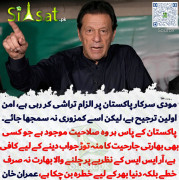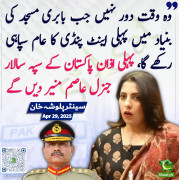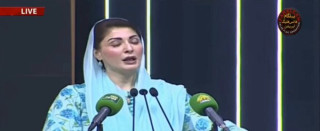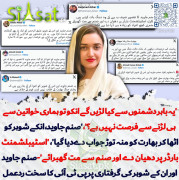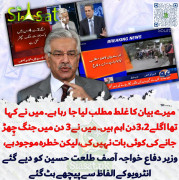CONCERNING THE STANDING OF THE PEOPLE AT THE CONCLUSION OF MAWLID, WHILE SENDING DARUD OR SALAWAT -- BLESSINGS AND SALUTATIONS -- ON THE HOLY PROPHET
Another objection of some consists in criticizing the standing of the people at the conclusion of Mawlid, in which the people address salutations and blessings to the Prophet. It is beyond reason how anyone can object to an act of obedience and worship which has been specifically enjoined by Allah in His Book when He said: "O Believers, send blessings and utmost salutations on him!" (33:56) and He also spoke in praise of "Those who remember Allah standing, and sitting, and on their sides" (3:191). Since remembering Allah and sending blessings on His Prophet are acts of worship, no attention is given to those who object to standing for the sake of fulfilling one of Allah's orders and greeting the Prophet according to Allah's order.
Furthermore, it is known that anyone who visits the Prophet in Madina is obliged to stand in front of him with utmost respect at the time he gives him greetings and salutations, and there is no difference in the greeting of Salam being given to the Prophet in front of him in Madina and the one given to him from thousands of miles away, according to many sound hadiths of which several are mentioned above in the section on Ziyarat or Visitation of the Prophet, among them the following:
"Whoever invokes blessings on me at my grave, I hear him, and whoever invokes blessings on me from afar, I am informed about it."[9]
"No one greets me except Allah has returned my soul to me so that I can return his Salam".[10]
Suyuti in Anba' al-adhkiya' bi hayat al-anbiya' said that radda means `ala al-dawam, i.e. permanently, and not temporarily: in other words, Allah does not return the soul and take it back, then return it again and then take it back again, but He has returned it to the Prophet permanently, and the Prophet is alive permanently, not intermittently as some ignorant people have suggested. To those who would differ with Imam Suyuti we say: his proof is irrefutable, since there are always people at prayer in the world during the entire twenty-four hour cycle, and sending salawat on the Prophet is part of salat. It follows that people are constantly invoking blessings and greetings on the Prophet without stop in the world, and that he is constantly returning it. This shows that the hadith of the Prophet on the return of his soul takes into consideration the continuity of prayer concomitant with the revolving five times of prayer around the world, and that indeed he is alive in permanence, since Allah has entitled him to return every single Salam that is made to him.
Nor is the appropriate time for standing while making salawat only at the time of Mawlid, but at any time, such as after salat, after Jum`a prayer, individually or in congregation. It is a voluntary act of worship that no one can forbid others from performing for the sake of obeying Allah.
Ibn Qunfudh al-Qusantini al-Maliki (d. 810) wrote in his book Wasilat al-islam bi al-nabi:
The Community is unanimous concerning the obligation to magnify and exalt the Prophet, his Family, and his Companions. It was the practice of the Pious Predecessors and the Imams of the past that whenever the Prophet was mentioned in their presence they were overwhelmed by reverence, humbleness, stillness, and dignity. Ja`far ibn Muhammad ibn `Ali ibn al-Husayn ibn `Ali ibn Abi Talib (Ja`far al-Sadiq) would turn pale whenever he heard the Prophet mentioned. Imam Malik would not mention a hadith except in a state of ritual purity. `Abd al-Rahman ibn al-Qasim ibn Muhammad ibn Abu Bakr al-Siddiq would turn red and stammer whenever he heard the Prophet mentioned. As for `Amir ibn `Abd Allah ibn al-Zubayr ibn al-`Awamm al-Asadi (one of the early sufis), he would weep until his eyes had no tears left in them. When any hadiths were mentioned in their presence they would lower their voices. Malik said: "His sacredness (hurmat) is in death is as his sacredness was in life."[11]
Another reason why it is desirable and recommended to be seen standing at the time of greeting the Prophet is that he himself ordered the Companions to stand up when Sa`d ibn Mu`adh came to him, as related by Bukhari in his Sahih: Qumu li sayyidikum or "Stand up for your master." What better master to stand for than the Prophet? Imam Nawawi demonstrated at length that standing out of respect for scholars was not only permissible but desirable in his book al-Tarkhis fi al-ikram bi al-qiyam, the full title of which reads: "The Permissibility of Honoring, By Standing Up, Those Who Possess Excellence and Distinction Among the People of Islam: In the Spirit of Piousness, Reverence, and Respect, Not in the Spirit of Display and Aggrandizement." The following discussion on the subject of standing out of respect is taken from Nawawi's Tarkhis, as well as his Sharh Sahih Muslim, Ibn Hajar's sections of Fath al-Bari following up on Nawawi's Tarkhis, and Sakhawi's own biography of Ibn Hajar entitled al-Jawahir wa al-durar:
1. From `Amr ibn Shu`ayb from his father from his grandfather: The Prophet said: "He is not of us who did not show mercy to our young ones and ignored the honor of our elders." Tirmidhi (Birr wa silat 4:322 #28) said: hasan sahih (fair and sound). Ahmad (2:185) narrates it but the second part is: "and ignored the right of our elders." Nawawi said: we related (by a chain) from Bukhari that he said: "I saw Ahmad ibn Hanbal and `Ali ibn al-Madani and Ishaq ibn Rahawayh cite the hadith of `Amr ibn Shu`ayb from his father from his grandfather as a proof -- and who are those who came after them!" Another version from Ibn `Abbas has: "...and does not treat our elders with reverence..." Tirmidhi (4:322 #28), but with a weaker chain.
2. From Maymun ibn Abi Shabib: A beggar passed by `A'isha and she gave him a chunk of bread. Another time a handsomely dressed man passed by her and she invited him to sit and eat. She was asked about it and she said: The Prophet said: anzilu al-nasa manazilahum: "Treat people according to their station." Abu Dawud related it with an interrupted (munqati`) chain; Muslim mentions it without chain in the introduction to his Sahih. Sakhawi says in his introduction (p. 5) to al-Jawahir wa al-durar (The diamonds and the pearls), his biography of his teacher Ibn Hajar al-`Asqalani: "This is a fair (hasan) hadith... Nawawi reports Ibn al-Salah's opinion that it is not definitely established as sound [although it satisfies Muslim's criterion], however, al-Hakim definitely establishes it as sound in the part that deals with the 16th kind of sound narration of his book Ma`rifat `ulum al-hadith (Knowledge of the Sciences of Hadith) where he also says: "Ibn Khuzayma declared it sound... al-Bazzar extracted it in his Musnad... so did Abu Dawud in his Sunan... al-`Askari in his Kitab al-amthal... Abu Ya`la in his Musnad... Bayhaqi in al-Adab... Abu Nu`aym in the Hilya..."
3. Abu Sa`id al-Khudri said: The people of Qurayza submitted to Sa`d ibn Mu`adh's arbitration, so the Prophet sent for Sa`d who came riding on his donkey. When he approached the mosque, Allah's Messenger said to the Ansar: "Stand up for your chieftain -- or: for the best among you --" then he said: "These people have submitted to your decision..." Muslim narrated it in his Sahih (Bk. 32 Jihad - Ch. 22 #1728).
NAWAWI'S COMMENTARY: There is in this hadith the proof for honoring persons of merit by standing up for them upon receiving them while they are coming towards us. Thus have the overwhelming majority of the scholars used this as a proof for the desirability of standing up. Qadi `Iyad said: "This is not the kind of standing that is forbidden. The latter is only when one sits and the others remain standing all through his sitting." I say: Standing up for the person of merit who is approaching is desirable; many ahadith have been related supporting it, while there is not one sound explicit prohibition against it.
4. Anas said that none was dearer to them than Allah's Messenger, and they would not stand up when they saw him due to their knowledge that he disliked it. Tirmidhi (Adab - 5:90 # 44) said it is hasan sahih (fair and sound).
NAWAWI'S COMMENTARY: This is the hadith most readily cited as a proof against standing up. There are two answers:
(1) The Prophet feared confusion for them and for their successors in their exaggeration in magnifying him, as he said in another hadith: "Do not praise me in the fashion that the Christians praised `Isa ibn Maryam" (Bukhari 6:478 Bk. 60 Anbiya' #48 and Ahmad 1:23,24). He disliked their standing for him for that reason. However, he did not dislike their standing for each other, and he even stood for some of them, and also they stood for others in his presence without his prohibiting it. Rather he approved it, and he ordered it in the hadith of standing up for Sa`d ibn Mu`adh... This is a clear answer in which none will see doubt except an ignorant person or a stubborn one.
(2) There was between the Prophet and his Companions a perfect state of love and purity which does not suffer addition through honoring by standing up, since there was no purpose being achieved by standing up, as opposed to standing up for someone else. One's companion who is near this state has no need of standing up.
IBN AL-HAJJ'S OBJECTIONS: (1) This answer is not complete except if it is first conceded that the Companions rose up for no one. If they got up for him then, it would be exaggeration. However, Nawawi affirms that they did this for other than him; how then does he deem it permissible for them to do with other than the Prophet what leaves no protection against exaggeration, while they do not do it with him? For if they do this to honor someone, then the Prophet is worthier of such honor, as we know from the source-texts which order us to honor him above everyone else. It seems that their rising for other than him was therefore only for a necessity caused by their arrival, or to congratulate them, and so forth, not for the reason that is being questioned [i.e. not due to respect].
(2) Nawawi's explanation can be reversed and it can be said that the Companion whose devotion to the Prophet has not been ascertained and who has not yet realized the stature of the Prophet is excused for not standing up, as opposed to him whose devotion is ascertained and whose station is greater in relation to the Prophet and his worth is known: he would apply himself (to respect him), because he would be certain that he deserves more piety and honor and reverence than any other. But Nawawi's saying makes it necessary that whoever is likelier to show respect to the Prophet and is closer in station to him, should show him less reverence than he who is far from him, due to intimacy and complete affection. The reality is other than that according to the authentic reports, as occurred in the story of the Prophet's oversight, whereas while Abu Bakr and `Umar were present among the people, they were too afraid to speak to him, Dhu al-Yadayn ("He of the Long Hands"-- perhaps al-Khirbaq al-Sulami) spoke to him despite his remoteness from the Prophet in station in comparison to Abu Bakr and `Umar. [A reference to the hadith in Bukhari (English 1:278-279) and Muslim whereby the Prophet prayed `Asr and gave salam after two rak`ats; this Companion said to him: "O Messenger of Allah, has the prayer been shortened or did you forget?" The Prophet replied that neither applied, then he prayed the remaining two rak`ats.
`ASQALANI'S REFUTATION OF IBN AL-HAJJ: (1) This objection of Ibn al-Hajj does not stand, because Imam Nawawi never said that the Companions' rising for the Prophet is considered exaggeration in order for Ibn al-Hajj to say: "This answer is not complete except if it is first conceded that the Companions rose up for no one. If they got up for him then, it would be exaggeration." What Imam Nawawi said is that the Prophet feared lest their rising should lead to exaggeration. That is why he forbade it to them, fearing exaggeration, lest they should fall into excess and confusion. Yes, he is worthier of being honored than any other, except that he feared that their showing him this particular mark of honor might lead to exaggeration and that is why he forbade it to them.
(2) With the second objection Ibn al-Hajj has contravened the universal custom of people in their companionship and their love. It is definitely known that the stronger the companionship and love between two people, the more superfluous certain formalities become between them. This is clear and needs no exposition. On the contrary, if companionship is weak and mutual acquaintance limited, a human being in that case needs to win his companion's love and affection with all kinds of honorific acts. This is because obtaining a person's love and affection is upheld by the transmitted reports dealing with giving honor. Now when love reaches the level where it is no longer increased by honorific acts, the latter are no longer necessary.
As for Ibn al-Hajj's objection that "Nawawi's saying makes it necessary that whoever is likelier to show respect to the Prophet and is closer in station to him, should show him less reverence than he who is far from him, due to intimacy and complete affection": it is an invalid necessity. That some formalities become superfluous between friends and loved ones does not mean that mutual reverence and respect become superfluous. This is clear and needs no exposition. Rather, the contrary is true: because the lover is of all people the most aware of the attributes of his beloved, and when the latter is graced with praiseworthy, high attributes, and people flock to give him proper respect and reverence, the lover is the most intense of all in respect and reverence due to his added knowledge of the attributes of the beloved.
As for Ibn al-Hajj's inference from the hadith of the Prophet's oversight, it does not impose itself due to the possibility that Abu Bakr and `Umar's silence may be for a reason other than fear, such as their knowledge that he disliked questioning, or their knowledge that he does not setlle on a mistake except Allah certainly informs him of it, or for another reason. Moreover, Ibn al-Hajj's inference contradicts what has been related concerning his attributes, namely that those who were far from him feared him, and that those who grew near him, frequented him, and saw his humbleness and the nobility of his manners, immediately were at ease with him and loved him. Here are some proofs:
Ibn Majah narrated (2:1101 Bk. 29 - at`ima Ch. 30) from Ibn Mas`ud that a man came to speak to the Prophet and he began to shake with fear. The Prophet said to him: "Put yourself at ease, for I am not a king, I am the son of a woman who ate sun-dried meat." Tirmidhi narrated (5:599 - Bk. 50 manaqib ch. 8) from `Ali at the end of his description: "Whoever saw him from afar was awed by him, and whoever mixed with him and grew to know him, loved him." The reason for this is the presence in the Prophet of the attributes of majesty and sanctity despite great humbleness before all who saw him.
5. Abu Mijlaz said: Mu`awiya went out to meet Ibn al-Zubayr and Ibn `Amir. The latter stood up while the former remained seated. Mu`awiya said to Ibn `Amir: "Sit, for I heard the Prophet say: "Whoever likes for men to stand up for him let him take his place in the fire." Tirmidhi's version mentions Ibn al-Zubayr and Safwan, and both get up. Abu Dawud narrated it (Adab 4:385), also Tirmidhi (Adab 5:90 #44) who said: hasan (fair) and Ahmad (4:94, 100).
NAWAWI'S COMMENTARY: Most people in disfavor of standing are fond of quoting this hadith. It is answered in many ways, (1) the soundest and best -- nay, the one answer which makes all others superfluous is that there is no proof against standing up in this hadith. Its plain, outward meaning is the explicit condemnation and harsh threat against any man who likes people to get up for him. There is neither prohibition nor other than prohibition concerning standing itself, and there is agreement about this... The gravity of the condemnation is in what takes place inside the mind of the person who likes people to stand for him. If there is no such thing in his mind there is no blame on him -- all this whether they get up or not... The prohibition revolves around the love of adulation not the act of standing. Therefore there is no proof in this hadith against the permissibility of standing.
(2) Another answer is that the hadith is mudtarib (disordered -- many incompatible narrations) according to the two imams of hadith Abu Bakr ibn Abi `Asim and Abu Musa al-Asbahani, and this is a necessary cause for the weakness of the hadith. However, this answer is open to question since both Tirmidhi and Abu Dawud have graded the hadith fair (hasan) and have spoken concerning it. Moreover, the disparity does not result in a disorder of the kind that makes it necessarily weak, and Allah knows best.
(3) The sayings of the imams and luminaries concerning whose eminence there is unanimity among the people of intellect and discernment: Abu Nasr Bishr ibn al-Harith al-Hafi al-Zahid, Abu Sulayman Hamd ibn Muhammad ibn Sulayman al-Khattabi, Abu Muhammad al-Husayn ibn Mas`ud al-Baghawi, and Abu Musa Muhammad ibn `Umar al-Asbahani the hafiz, may Allah be well pleased with all of them: [after quoting the isnad] Ahmad ibn al-Mughlis said: Abu Nasr ibn al-Harith said, after I mentioned this hadith in front of him: "He only disliked the standing from the perspective of arrogance, but from the perspective of sincere love, he did not, since he himself stood up for `Ikrima ibn Abu Jahl... and he said: "Stand for your chief," and he said: "He who likes people to stand for him..." indicating that whoever likes people to stand for him, you must not stand for him." As for Baghawi and Khattabi as we mentioned with our isnad they spoke to the effect that the hadith concerns only those who order others from the perspective of pride and arrogance. Abu Musa said: "The meaning of the hadith is those who make men stand around them like courtiers stand around kings."
6. From Abu Amama: The Prophet came out leaning on a stick and we rose up for him. He said: "Do not get up in the manner of the foreigners who aggrandize each other." Abu Dawud narrated it (Adab - 4:358). Ibn Majah's version (Du`a #34, 2:1261): "Do not do as the Persians do with their great ones."
NAWAWI'S COMMENTARY: The answer is in two beautiful ways: (1) The two Imams Abu Bakr ibn Abi `Asim and Abu Musa al-Asbahani said that this is a weak hadith which cannot be used as a proof. Abu Bakr said: "This hadith cannot be established and its sub-narrators are unknown." I say: to this is added the fact that it is "mudtarib" (disordered -- see above), and it would suffice that only one of these two factors were present to grade it as weak, let alone two.
(2) The hadith in itself is crystal-clear as to its intent as opposed to that of the rest: namely, it purports to condemn those who stand for the purpose of aggrandizement. That is why he said: "Do not get up in the manner of the foreigners who aggrandize each other." There is no doubt as to what is being condemned. And Allah knows best.
7. From (Nafi`) Abu Bakra: The Prophet said: "Let no man stand from his seat for another." Abu Musa al-Asbahani narrated it with his chain. Al-hafiz Abu al-Qasim Ibn `Asakir said in his book al-Atraf that Abu Dawud narrated in the book of Adab (4:258). The chain has Abu `Abd Allah Mawla Al Abi Burda, who is unknown. See al-Taqrib #8215.
NAWAWI'S COMMENTARY: The answer to this is the same two answers as the preceding section... There is possibly a third way to answer it reasonably. The meaning would be: "Do not get up from the place of prayer, of listening to a sermon and to remembrance and knowledge et cetera, for it is disliked that one should give up one's seat in such cases, or leave it and take another farther away from the imam.
The same is true of all gestures that are similar to these, and we consider this to muster the general agreement of scholars, as opposed to giving up one's food and drink and other things related to one's personal lot: to give those up is a most desirable thing, one of the marks of the righteous and among the manners of saints and knowers, concerning which this verse was revealed: "They prefer others above themselves though poverty become their lot" (59:9).
The difference between the two types of sacrifice is that the right, in the person's nearness, belongs to Allah the Exalted, and to transfer it is not permissible, as opposed to food and the like where the right belongs to the person, although in some cases it belongs to Allah even then...
8. Nawawi also said:
al-Shaykh Abu Muhammad told us:
Abu Taher al-Khashaw`i told us:
Abu Muhammad al-Akfani told us:
Al-hafiz Abu Bakr al-Khatib al-Baghdadi told us by permission not hearing:
Al-Husayn ibn `Ali al-Jawhari told us:
`Amr ibn al-`Abbas al-Khazzaz related to us:
Abu Bakr al-Sawli told us:
Ishaq ibn Ibrahim al-Qazzaz told us:
Ishaq al-Shahidi related to us:
I would see Yahya al-Qattan -- may Allah the Exalted have mercy on him -- pray the midafternoon prayer, then sit with his back against the base of the minaret of his mosque. Then `Ali ibn al-Madini, al-Shadhakuni, `Amr ibn `Ali, Ahmad ibn Hanbal, Yahya ibn Ma`in, and others would stand before him and ask him questions about hadith standing on their feet until it was time for the sunset prayer. He would not say to a single one of them: "Sit" nor would they sit, out of awe and reverence.
9. It is related that when Abu Hanifa visited Sufyan after the death of the latter's brother Sufyan stood up, went to greet him, embraced him, and bade him sit in his place, saying to those who questioned this act: "This man holds a high rank in knowledge, and if I did not stand up for his science I would stand up for his age, and if not for his age then for his godwariness (wara`), and if not for his godwariness then for his jurisprudence (fiqh)." It is narrated by Suyuti in Tabyid al-sahifa (p. 32) and al-Tahanawi in his book Inja' al-watan (1:19-22).
10. al-Hakim narrates in Ma`rifat `ulum al-hadith (p. 104) that when al-Dhuhli went to see Imam Ahmad the latter stood up for him and the people were astounded. Then he told his son and his companions: "Go to Abu `Abd Allah [al-Dhuhli] and write his narrations."
11. Nawawi also said: the hafiz Abu Musa al-Asbahani (d. 581) recited:
qiyami wa al-`azizi ilayka haqqun
I swear by the All-Powerful that my standing for you (O Prophet) is right and true
wa tarku al-haqqi ma la yastaqimu
and to leave truth and right is to embrace error
fa hal ahadun lahu `aqlun wa lubbun wa ma`rifa
yaraka fa la yaqumu?
I ask: can anyone possessed of a mind and a heart
and knowledge, upon seeing you, not stand up?[12]
We hold, as Ibn Hajar al-`Asqalani, Nawawi and Abu Musa al-Asbahani, that no one possessed of a heart and mind can object to standing for the sake of the Prophet, and that this is desirable and recommended not only in the time of the Prophet but until the end of time. Observe that the hafiz Abu Musa died in 581, more than five centuries after the time of the Prophet, and yet stands for him in the present tense and mentions "seeing him": this seeing of the Prophet by the pious believers both in a sleeping and a wakeful state is an attested fact in the Shari`a which has been mentioned by the scholars, among them al-Haytami in his Fatawa hadithiyya:
He was asked: "Is it possible to meet the Prophet while awake in our time?"
He replied: "Yes, it is possible. It has been asserted as part of the miracles of saints (karamat al-awliya') by Ghazali, al-Barizi, al-Taj al-Subki, and al-Yafi`i among the Shafi`is, and by al-Qurtubi and Ibn Abi Jamra among the Malikis. It has been narrated that one of the awliya' was sitting in the assembly of a jurist (faqih) while the latter related a hadith, whereupon the wali said: "This hadith is false." The jurist said: "How do you know that?" The wali replied: "There is the Prophet standing right next to you, and he is saying: "I never said this." When he said this the sight of the faqih was unveiled and he could see the Prophet."[13]
The above kind of testimony constitutes evidence that the Prophet hears and sees us, as has been stated by the hadiths to the effect that he sees our actions and hears our greetings and blessings, and that he intercedes for us as we mention below, in the section on Ziyara. Following we present further sound evidence that the Prophet is alive in his grave and we conclude by asking: If it is meritorious to stand as a mark of respect for others in religion, and if the Prophet is alive and hears us, and if he himself ordered the Companions to stand for their sayyid, then what better sayyid to stand for than the Prophet himself, and what other act of standing can possibly compete with this one in merit and excellence?
"Allah has defended the earth from consuming the bodies of Prophets".
A sound (sahih) tradition related on the authority of Aws ibn Aws al-Thaqafi by: Ahmad in his Musnad, Ibn Abi Shayba in the Musannaf, Abu Dawud in the Sunan, Nisa'i in his Sunan, Ibn Majah in his Sunan, Darimi in his Musnad, Ibn Khuzayma in his Sahih, ibn Hibban in his Sahih, Hakim in the Mustadrak, Tabarani in his Kabir, Bayhaqi in Hayat al-anbiya', Suyuti in Anba' al-adkhiya, Dhahabi who confirmed Hakim's grading, and Nawawi in the Adhkar. Another version in Ibn Majah has this addition: "And the Prophet of Allah is alive and provided for (fa nabiyyullahi hayyun yurzaq)." Bayhaqi mentions it also in the Sunan al-kubra.
"The Prophets are alive in their graves, praying to their Lord".
A sound (sahih) tradition related on the authority of Anas ibn Malik by: al-Bazzar in his Musnad, Abu Ya`la in his Musnad, Ibn `Adi in al-Kamil fi al-du`afa', Tammam al-Razi in al-Fawa'id, al-Bayhaqi in Hayat al-anbiya' fi quburihim, Abu Nu`aym in Akhbar Asbahan, Ibn `Asakir in Tarikh Dimashq, al-Haythami in Majma` al-zawa'id (8:211), Suyuti in Anba' al-adhkiya' bi-hayat al-anbiya' (#5), and al-Albani, in Silsilat al-ahadith al-sahiha (#621). Suyuti adds: "The life of the Prophet in his grave, and [also] that of the rest of the prophets is known to us as definitive knowledge (`ilman qat`iyyan)."
"(The night I was enraptured to my Lord) I saw Musa standing in prayer in his grave".
A sound (sahih) tradition related on the authority of Anas and others by Muslim, Nasa'i, Bayhaqi in the Dala'il al-nubuwwa and the Hayat al-anbiya', and others. Some mention the beginning (in parentheses), while others omit it. Nawawi said in his explanation of this hadith: "The work of the next world is all dhikr and du`a" (Sharh Sahih Muslim 1/73/267).
"No one greets me except Allah has returned my soul to me so that I can return his salam".
Abu Hurayra in Abu Dawud (Manasik #2039) with a sound chain; Ibn `Asakir, Mukhtasar Tarikh Dimashq 2:407; Ahmad, Musnad 2:527; Abu Nu`aym, Akhbar Asbahan 2:353; Ibn al-Najjar, Akhbar al-Madina p. 145; Bayhaqi, Shu`ab al-iman #4161; Haythami, Majma` al-zawa'id 10:162; Ibn Kathir, Tafsir 6:464; al-Mundhiri, al-Targhib wa al-tarhib 2:499; Talkhis al-habir 2:267.
This hadith has been adduced by the scholars as the legal proof for the validity and modality of visiting and greeting the Prophet, although the hadith does not mention the necessity of physically visiting the Prophet in Madina.
A note about the translation of "has returned": Suyuti in Anba' al-adhkiya' bi hayat al-anbiya' and Haytami in al-Jawhar al-munazzam said that radda means `ala al-dawam, i.e. permanently, and not temporarily: in other words, Allah does not return the soul and take it back, then return it again and then take it back again, but He returned it to the Prophet permanently, and the Prophet is alive permanently.
Sakhawi, Ibn Hajar al-`Asqalani's student, said: "As for us (Muslims of Ahl al-Sunna) we believe and we confirm that he is alive and provided for in his grave" (al-Qawl al-badi` p. 161). Ibn al-Qayyim said in Kitab al-ruh p. 58: "It is obligatory knowledge to know that his body is in the earth tender and humid (i.e. as in life), and when the Companions asked him: "How is our greeting presented to you after you have turned to dust" he replied: "Allah has defended the earth from consuming the flesh of Prophets," and if his body was not in his grave he would not have given this answer." Ibn Hajar al-Haythami wrote in al-Jawhar al-munazzam:
The proofs and the transmitted texts have been established as authentic in the highest degree that the Prophet is alive and tender... that he fasts and performs pilgrimage every year, and that he purifies himself with water which rains on him.
"Whoever invokes blessings on me at my grave, I hear him, and whoever invokes blessings on me from afar, I am informed about it."
Abu al-Shaykh cites it in Kitab al-Salat `ala al-nabi ("Jala' al-afham" p. 22), and Ibn Hajar says in Fath al-Bari (6:379): "Abu al-Shaykh cites it with a good chain (sanad jayyid)." Bayhaqi mentions it in Hayat al-anbiya and Shu`ab al-iman (2:218 #1583) with ublightuhu in the end.
"Whoever visits my grave, my intercession becomes guaranteed for him."
Narrated by al-Daraqutni, al-Dulabi, al-Bayhaqi, Khatib al-Baghdadi, al-`Uqayli, Ibn `Adi, Tabarani, and Ibn Khuzayma in his Sahih, all through various chains going back to Musa ibn Hilal al-`Abdi from `Ubayd Allah Ibn `Umar, both from Nafi`, From Ibn `Umar. Dhahabi declared this chain hasan (fair) as narrated, in Mizan al-i`tidal, vol. 4, p. 226 and he said: "Huwa salih al-hadith" which means: "He -- Musa ibn Hilal -- is good in his narrations." This is also Imam Ahmad's opinion as related by Shawkani in Nayl al-awtar 5:95. Imam Sakhawi confirmed Dhahabi's grading in the Maqasid al-hasana, and al-Lucknawi also declared it hasan in his commentary on Jurjani entitled Zafr al-amani p. 422 (3rd ed.) while al-Subki declared it sahih as stated by Samhudi in Sa`adat al-darayn 1:77, and Shawkani said: "Ibn al-Sakan, `Abd al-Haqq (ibn al-Kharrat al-Ishbili), and Taqi al-Din al-Subki have declared this hadith sound (sahih)." Ibn `Adi said in al-Kamil fi al-Du`afa (6:2350): "He [Musa ibn Hilal] is most likely acceptable; other people have called him "unknown" [i.e. Abu Hatim al-Razi and al-`Uqayli] and this is not true... He is one of the shuyukhs of Imam Ahmad and most of them are trustworthy." Even the "Salafi" Albani declared him thabit al-riwaya (of established reliability) in his Irwa' (4:338). About `Ubayd Allah ibn `Umar al-`Umari:
- Dhahabi calls him saduq hasan al-hadith [truthful, of fair narrations] in al-Mughni 1:348;
- Sakhawi says of him salih al-hadith [of sound narrations] in al-Tuhfa al-latifa 3:366;
- Ibn Ma`in said to Darimi about him: salih thiqa [sound and reliable] in al-Kamil 4:1459.
This is one of the proof-texts adduced by the ulama of Islam to derive the obligation or recommendation of visiting the Prophet's grave and seeking him as a wasila (intermediary / means), as we have cited in the present book from the chapters on visiting the Prophet's grave in Nawawi's book al-Adhkar and al-Idah and in Qadi Iyad's book al-Shifa. Sakhawi said in al-Qawl al-badi` (p. 160):
The emphasis and encouragement on visiting his noble grave is mentioned in numerous hadiths, and it would suffice to show this if there was only the hadith whereby the truthful and God-confirmed Prophet promises that his intercession among other things becomes obligatory for whoever visits him, and the Imams are in complete agreement from the time directly after his passing until our own time that this is among the best acts of drawing near to Allah.
A sound (sahih) tradition related on the authority of Anas ibn Malik by: al-Bazzar in his Musnad, Abu Ya`la in his Musnad, Ibn `Adi in al-Kamil fi al-du`afa', Tammam al-Razi in al-Fawa'id, al-Bayhaqi in Hayat al-anbiya' fi quburihim, Abu Nu`aym in Akhbar Asbahan, Ibn `Asakir in Tarikh Dimashq, al-Haythami in Majma` al-zawa'id (8:211), Suyuti in Anba' al-adhkiya' bi-hayat al-anbiya' (#5), and al-Albani, in Silsilat al-ahadith al-sahiha (#621). Suyuti adds: "The life of the Prophet in his grave, and [also] that of the rest of the prophets is known to us as definitive knowledge (`ilman qat`iyyan)."
"(The night I was enraptured to my Lord) I saw Musa standing in prayer in his grave".
A sound (sahih) tradition related on the authority of Anas and others by Muslim, Nasa'i, Bayhaqi in the Dala'il al-nubuwwa and the Hayat al-anbiya', and others. Some mention the beginning (in parentheses), while others omit it. Nawawi said in his explanation of this hadith: "The work of the next world is all dhikr and du`a" (Sharh Sahih Muslim 1/73/267).
"No one greets me except Allah has returned my soul to me so that I can return his salam".
Abu Hurayra in Abu Dawud (Manasik #2039) with a sound chain; Ibn `Asakir, Mukhtasar Tarikh Dimashq 2:407; Ahmad, Musnad 2:527; Abu Nu`aym, Akhbar Asbahan 2:353; Ibn al-Najjar, Akhbar al-Madina p. 145; Bayhaqi, Shu`ab al-iman #4161; Haythami, Majma` al-zawa'id 10:162; Ibn Kathir, Tafsir 6:464; al-Mundhiri, al-Targhib wa al-tarhib 2:499; Talkhis al-habir 2:267.
This hadith has been adduced by the scholars as the legal proof for the validity and modality of visiting and greeting the Prophet, although the hadith does not mention the necessity of physically visiting the Prophet in Madina.
A note about the translation of "has returned": Suyuti in Anba' al-adhkiya' bi hayat al-anbiya' and Haytami in al-Jawhar al-munazzam said that radda means `ala al-dawam, i.e. permanently, and not temporarily: in other words, Allah does not return the soul and take it back, then return it again and then take it back again, but He returned it to the Prophet permanently, and the Prophet is alive permanently.
Sakhawi, Ibn Hajar al-`Asqalani's student, said: "As for us (Muslims of Ahl al-Sunna) we believe and we confirm that he is alive and provided for in his grave" (al-Qawl al-badi` p. 161). Ibn al-Qayyim said in Kitab al-ruh p. 58: "It is obligatory knowledge to know that his body is in the earth tender and humid (i.e. as in life), and when the Companions asked him: "How is our greeting presented to you after you have turned to dust" he replied: "Allah has defended the earth from consuming the flesh of Prophets," and if his body was not in his grave he would not have given this answer." Ibn Hajar al-Haythami wrote in al-Jawhar al-munazzam:
The proofs and the transmitted texts have been established as authentic in the highest degree that the Prophet is alive and tender... that he fasts and performs pilgrimage every year, and that he purifies himself with water which rains on him.
"Whoever invokes blessings on me at my grave, I hear him, and whoever invokes blessings on me from afar, I am informed about it."
Abu al-Shaykh cites it in Kitab al-Salat `ala al-nabi ("Jala' al-afham" p. 22), and Ibn Hajar says in Fath al-Bari (6:379): "Abu al-Shaykh cites it with a good chain (sanad jayyid)." Bayhaqi mentions it in Hayat al-anbiya and Shu`ab al-iman (2:218 #1583) with ublightuhu in the end.
"Whoever visits my grave, my intercession becomes guaranteed for him."
Narrated by al-Daraqutni, al-Dulabi, al-Bayhaqi, Khatib al-Baghdadi, al-`Uqayli, Ibn `Adi, Tabarani, and Ibn Khuzayma in his Sahih, all through various chains going back to Musa ibn Hilal al-`Abdi from `Ubayd Allah Ibn `Umar, both from Nafi`, From Ibn `Umar. Dhahabi declared this chain hasan (fair) as narrated, in Mizan al-i`tidal, vol. 4, p. 226 and he said: "Huwa salih al-hadith" which means: "He -- Musa ibn Hilal -- is good in his narrations." This is also Imam Ahmad's opinion as related by Shawkani in Nayl al-awtar 5:95. Imam Sakhawi confirmed Dhahabi's grading in the Maqasid al-hasana, and al-Lucknawi also declared it hasan in his commentary on Jurjani entitled Zafr al-amani p. 422 (3rd ed.) while al-Subki declared it sahih as stated by Samhudi in Sa`adat al-darayn 1:77, and Shawkani said: "Ibn al-Sakan, `Abd al-Haqq (ibn al-Kharrat al-Ishbili), and Taqi al-Din al-Subki have declared this hadith sound (sahih)." Ibn `Adi said in al-Kamil fi al-Du`afa (6:2350): "He [Musa ibn Hilal] is most likely acceptable; other people have called him "unknown" [i.e. Abu Hatim al-Razi and al-`Uqayli] and this is not true... He is one of the shuyukhs of Imam Ahmad and most of them are trustworthy." Even the "Salafi" Albani declared him thabit al-riwaya (of established reliability) in his Irwa' (4:338). About `Ubayd Allah ibn `Umar al-`Umari:
- Dhahabi calls him saduq hasan al-hadith [truthful, of fair narrations] in al-Mughni 1:348;
- Sakhawi says of him salih al-hadith [of sound narrations] in al-Tuhfa al-latifa 3:366;
- Ibn Ma`in said to Darimi about him: salih thiqa [sound and reliable] in al-Kamil 4:1459.
This is one of the proof-texts adduced by the ulama of Islam to derive the obligation or recommendation of visiting the Prophet's grave and seeking him as a wasila (intermediary / means), as we have cited in the present book from the chapters on visiting the Prophet's grave in Nawawi's book al-Adhkar and al-Idah and in Qadi Iyad's book al-Shifa. Sakhawi said in al-Qawl al-badi` (p. 160):
The emphasis and encouragement on visiting his noble grave is mentioned in numerous hadiths, and it would suffice to show this if there was only the hadith whereby the truthful and God-confirmed Prophet promises that his intercession among other things becomes obligatory for whoever visits him, and the Imams are in complete agreement from the time directly after his passing until our own time that this is among the best acts of drawing near to Allah.
References:
[1]Ibn Hisham's notes to his Sirat Rasul Allah, trans. A. Guillaume, 9th printing (Karachi: Oxford U. Press, 1990)p. 797.
[2]Narrated from Shaddad ibn Aws by al-Bazzar, Abu Ya`la, and Tabarani. Haythami said in Majma` al-zawa'id (1:47): "Its narrators are the men of the sound collections." Ibn Hajar mentioned this hadith in his Fath al-Bari (7:199) without saying anything against it.
[3]Ibn Taymiyya, Majmu`at fatawa Ibn Taymiyya 22:523.
[4]Ibn Kathir, Mawlid Rasul Allah, ed. Salah al-Din Munajjad (Beirut: dar al-kitab al-jadid, 1961).
[5]Suyuti, al-Hawi li al-fatawi as cited in al-Misri's The Reliance of the Traveller, trans. Noah Ha Mim Keller, section w58.0.
[6]Ibn al-Jawzi, Mawlid al-`arus, Damascus: maktabat al-hadara 1955.
[7]The hadith is in Bayhaqi's Sunan, Vol. 9 p. 300, and in Haythami's Majma` al-Zawa'id, Vol. 4, p. 59, who says that al-Bazzar and Tabarani relate it, the latter with a sound chain of transmission.
[8]Ibn Hajar, Fath al-Bari (Cairo: al-Halabi, 1378 /1959) 5:156-157; (Beirut: Dar al-kutub al-`ilmiyya, 1410/1989) 4:318.
[9]Abu al-Shaykh cites it in Kitab al-Salat `ala al-nabi (Jala' al-afham p. 22), and Ibn Hajar says in Fath al-Bari (6:379): "Abu al-Shaykh cites it with a good chain (sanad jayyid)." Bayhaqi mentions it in Hayat al-anbiya and Shu`ab al-iman (2:218 #1583) with ublightuhu instead of bullightuhu in the end.
[10]Abu Hurayra in Abu Dawud (Manasik #2039) with a sound chain; Ibn `Asakir, Mukhtasar Tarikh Dimashq 2:407; Ahmad, Musnad 2:527; Abu Nu`aym, Akhbar Asbahan 2:353; Ibn al-Najjar, Akhbar al-Madina p. 145; Bayhaqi, Shu`ab al-iman #4161; Haythami, Majma` al-zawa'id 10:162; Ibn Kathir, Tafsir 6:464; al-Mundhiri, al-Targhib wa al-tarhib 2:499; Talkhis al-habir 2:267.
[11]Abu al-`Abbas Ahmad ibn al-Khatib, known as Ibn Qunfudh al-Qusantini al-Maliki, Wasilat al-islam bi al-nabi `alayhi al-salat wa al-salam (The means to Islam with the Prophet, peace be upon him) (Beirut: Dar al-gharb al-islami, 1404/1984) p. 145-146.


